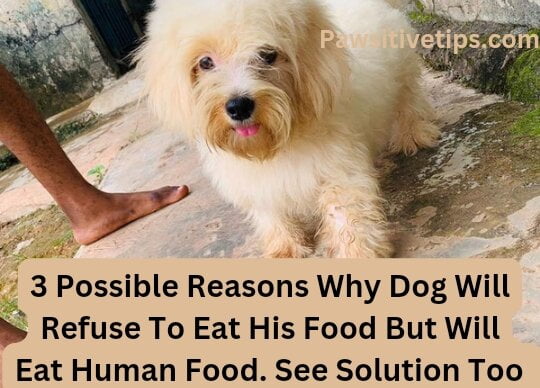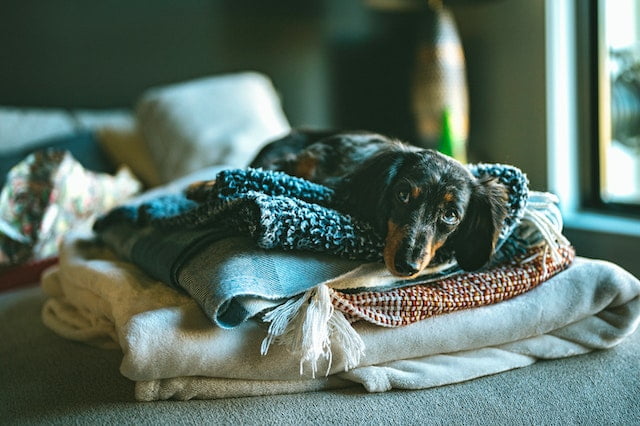Why Won’t My Dog Eat His Food But Will Eat Human Food? (2024)
If your dog is refusing to eat his food but will eat human food, you’re not alone. This is a common problem that can be caused by many things. Personally, I don’t see anything wrong with your dog eating human food, except for a few human foods that are dangerous to dogs. But I know there are many dog owners who may not like this behavior, hence the question. So in this Pawsitive Tips, we will delve into the various reasons why your dog won’t eat his food but will eat human food.
Why won’t my dog eat his food but will eat human food? (3 Possible Causes)
There are a number of possible reasons why your dog might be refusing his food but will eat human food. Some of the most common causes include:
1: Your Dog May Be Sick
One of the most common reasons why a dog might refuse to eat his food but will eat human food is because he’s sick. There are a number of different illnesses that can cause dogs to lose their appetite for their regular kibble, including:
- Infections: Bacterial or viral infections, such as parvovirus or distemper, can often cause dogs to not feel well and lose their appetite.
- Pain or dental problems: Just like humans, dogs can experience dental issues such as gum disease, broken teeth, or tooth decay. Dental pain can make it uncomfortable for your dog to chew their regular kibble, leading them to avoid it altogether. You might notice them dropping food from their mouth or chewing on one side to avoid discomfort. So, when your dog is having dental pain and you offer a soft human food that can be easily swallowed without chewing, what do you think the dog will do? He will simply avoid the regular kibbles and eat human food.
- Food allergies and intolerances: Dogs, like humans, can develop allergies or intolerances to certain ingredients in their food. If they experience itching, skin problems, or digestive disturbances after eating, they might associate their regular food with discomfort and seek alternatives, which are human foods.
- Digestive problems: If your dog has an upset stomach, diarrhea, or constipation, he may not want to eat because he’s feeling nauseous or uncomfortable.
2: There May Be Something Wrong With The Food
Another possible reason why your dog might refuse to eat his food but will eat human food is because there’s something wrong with it. The dog’s food could be spoiled, have gone bad, or simply not be to your dog’s taste.
If you’ve recently changed your dog’s food, it’s possible that he’s just not used to the new flavor or texture. If this is the case, you may need to slowly transition him to the new food over a few days.
You should also check the expiration date on your dog’s food to make sure it’s not expired. If it is, throw it out and get a new bag.
If you’ve ruled out all of the other possibilities and you’re still not sure why your dog is refusing to eat his food, it’s possible that it’s a behavioral issue.
3: It May Be A Behavioral Issue
In some cases, dogs may refuse to eat their food for behavioral reasons. This could be due to:
- Anxiety or stress: If your dog is anxious or stressed, he may not be interested in eating. This could be caused by a change in his environment, such as a new pet or a new baby, or by a traumatic event, such as a thunderstorm or a car accident.
- Demanding attention: Some dogs may learn that if they refuse to eat, they’ll get more attention from their owners. This can be a problem if you give in and give your dog human food or treats.
- Picky eating: Some dogs are simply picky eaters and will only eat certain foods. If your dog is a picky eater, you may need to be patient and persistent in trying to get him to eat his food.
Related articles:
- My dog won’t eat breakfast but eats dinner (Here’s what to do)
- Is It Bad For Dogs To Eat Late At Night?
- Should I give my dog a treat before bed?
- Best time to feed dogs so they don’t poop at night
What do I do if my dog only wants to eat human food?
Since you’ve been able to discover the reasons behind your dog not eating his food but eating human food, then it’s essential to address this behavior to ensure their nutritional needs are met and to prevent potential health issues. And to do that, here’s what you can do:
- Consult with a Veterinarian: First and foremost, schedule a visit to the veterinarian to rule out any underlying health problems that might be causing your dog’s picky eating behavior. Medical issues such as dental problems, gastrointestinal disturbances, or food allergies need to be addressed to improve their appetite.
- Avoid Feeding Human Food: If you want your dog to start eating his food instead of human food, then you need to stop feeding him human food. I understand it might be tempting to give in to your dog’s desires, but feeding him human food regularly can reinforce this picky eating behavior.
- Try Different Food Brands and Flavors: If your dog is used to eating a certain brand or flavor of food, he may be refusing to eat it because he’s bored. Try switching to a different brand or flavor to see if that helps.
- Make Sure Your Dog’s Food is Fresh and Appealing: If your dog’s food is old or stale, he may not be interested in eating it. Make sure to store his food properly and replace it regularly.
- Stick to a Balanced Diet: Ensure that your dog is getting a nutritionally balanced diet through high-quality commercial dog food. Look for options with natural ingredients, appropriate protein sources, and essential nutrients tailored to your dog’s age, size, and health requirements.
- Add Water or Broth to your Dog’s Food: If your dog’s food is too dry, he may not be interested in eating it. Try adding some water or broth to moisten it up.
- Gradual Transition: If you decide to change your dog’s diet or introduce new dog food, do it gradually. Sudden changes can upset their stomachs and lead to further aversions to their meals. Mix a small amount of the new food with their regular food and gradually increase the ratio over a week or so.
- Establish a Consistent Feeding Schedule: Dogs thrive on routine, so establish a regular feeding schedule. Offer their meals at the same times each day and avoid leaving food out all day, as this can contribute to picky eating behavior.
- Exercise and Mental Stimulation: Ensure your dog gets enough exercise and mental stimulation throughout the day. A tired and engaged dog is more likely to have a healthy appetite.
- Be Patient: Finally, you need to be patient with your dog while trying to change his eating habits. Avoid scolding or punishing your dog for not eating, as this can lead to further anxiety around food.
Frequently Asked Questions
Is it harmful to give my dog small amounts of human food occasionally?
I wouldn’t say it is harmful to give your dog small amounts of certain dog-safe human food, as occasional treats might be okay, but it’s best to avoid it altogether to prevent picky eating habits.
How can I tell if my dog’s picky eating is due to health issues?
If your dog’s picky eating is accompanied by other symptoms like vomiting, diarrhea, or lethargy, it’s essential to consult a veterinarian.
Are there any human foods that are safe for dogs to eat regularly?
It’s best to stick to a balanced and complete dog food diet, but some human foods, like plain, cooked vegetables or fruits, can be given in moderation.
Related articles:
Should I hand-feed my dog to encourage them to eat?
Hand-feeding might work as a short-term solution, but it’s essential to gradually transition back to regular feeding methods.
What are some things I can do to make my dog’s food more appealing?
Here are some of the things you can do to make your dog’s food more appealing:
- Warm up the food.
- Add some water or broth.
- Add some cooked meat or vegetables.
- Change the brand or flavor of the food. You may need to consider going for wet food. They are very good and nutritious for your dog.
- Serve the food in a different bowl.
That’s it on the question, “Why won’t my dog eat his food but will eat human food?” I hope this article has been helpful. If you have any other questions, please feel free to ask.



